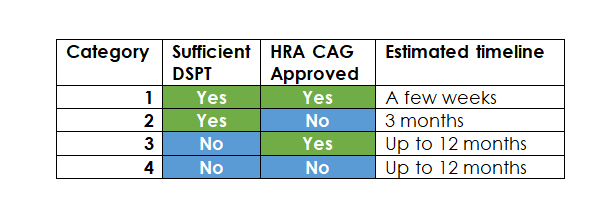Information for Organisations
We are inviting hospitals in North London and the East of England to join our project and help to legally provide prehospital professionals with information from the hospital phase of care to help with their continuing professional development and wellbeing.
We believe that the historic barriers which have prevented reliable access to such clinical outcomes are an ongoing patient safety issue due to the obstruction of good clinical governance. These barriers also go against both the General Medical Council and Health and Care Professions Council guidance which emphasise the importance of reflective practice for continuing professional development. We also believe that this is not an isolated issue which is sole responsibility of the prehospital care community to solve. The communities who are attended to by prehospital teams are the same as the communities for whom our hospitals have a responsibility to care as well. We hope that your hospital can help to bridge this gap in teaching and staff welfare.
The evidence-base for hospital to prehospital feedback at this early stage is currently not nearly as strong as we believe it is destined to be. As such, we remain a voluntary group of clinicians working without funding. Once embedded at more sites, we will be able to accumulate larger data sets to make a stronger argument for funding and other resources to address this overlooked but vital deficit in the region’s clinical governance activities.
Hospital Team Supervisors
Interested hospitals will require a supervising consultant doctor, consultant nurse, manager, matron or equivalent to ensure continuity of service and orientation of new team members as they rotate into the hospital team and local support with roles and departments like Caldicott Guardians, IT teams, IG teams and the hospital’s patient representatives group.
Hospital Team Members
Teams can be made of staff employed by the hospital and are likely to have clinical roles such as doctors, nurses, Advanced Care Practitioners, Emergency Nurse Practitioners, Physician associates etc. One of these team members should be nominated as the Site Lead and be the main point of contact with the PHEM Feedback project group. Should hospitals wish to explore the use of non-clinical staff who are trained in extracting information from patient records then we can discuss this.
Hospitals
Trusts currently fit in a few categories:
- Both already on our health research authority (HRA) application AND have adequate NHS Digital ‘Toolkit’ scores
- Not yet on our HRA application BUT do have adequate toolkit scores
- Already on our HRA application BUT do NOT have adequate toolkit scores
- Neither on our HRA application AND do NOT have adequate toolkit scores
Trusts only tend to submit their toolkits on an annual basis.
The estimated timeline for new hospitals to become operational is dependent on the category above.
- Very rapid progress - a matter of weeks
- Fairly rapid progress - around 3 months
- Slower but eventual progress - up to 12 months
- Slower but eventual progress - up to 12 months

DSPT- Trust ‘Data Security and Protection Toolkit’ Score. Every trust has a score and submits evidence on an annual basis when their scores are revised.
HRA CAG- Health Research Authority Confidentiality Advisory Group. We add your hospital to the application we have already submitted to and had approved by them as an amendment.
We are happy to ‘get the ball rolling’ even at those sites which may not be able to be active immediately though once we have firm interest. We accept that there will be those who prefer alternative or their own existing solutions but if you want to explore PHEM Feedback at your hospital then please get in touch.
Ambulance Data Set
The Ambulance Data Set (ADS) is an incredibly exciting project which is being run by NHS England and NHS Digital. We are pleased to have been able to provide some advice and support to their efforts as ADS mirrors the ethos of PHEM Feedback. The ADS aims to link information from the ambulance services with data from hospitals and will likely play a huge role in hospital to prehospital feedback in the future.
From what we have been told, it is estimated to go live in its full form (subject to a successful pilot) in May 2022. It is not clear whether air ambulance organisations will be included at this stage or how granular the data will be compared to the information extracted by hospital teams in the PHEM Feedback model.
We wish the ADS team the best of luck with this vital project. Until such time as it can be demonstrated to adequately replace the breadth of learning and wellbeing support which is provided by PHEM Feedback and other hospital to prehospital projects like it, we hope to continue to provide our service to our prehospital colleagues and we hope your hospital can help us to achieve this.
Royal College of Emergency Medicine Short Life Working Group (RCEM SLWG) on Hospital to Prehospital Feedback
We are very pleased and excited to be contributing to the RCEM SLWG which aims to establish the standards required for hospital to prehospital feedback to be conducted in the UK. The group is at an early stage and we will continue to contribute to its efforts alongside our own plans to expand throughout the East of England and London.
